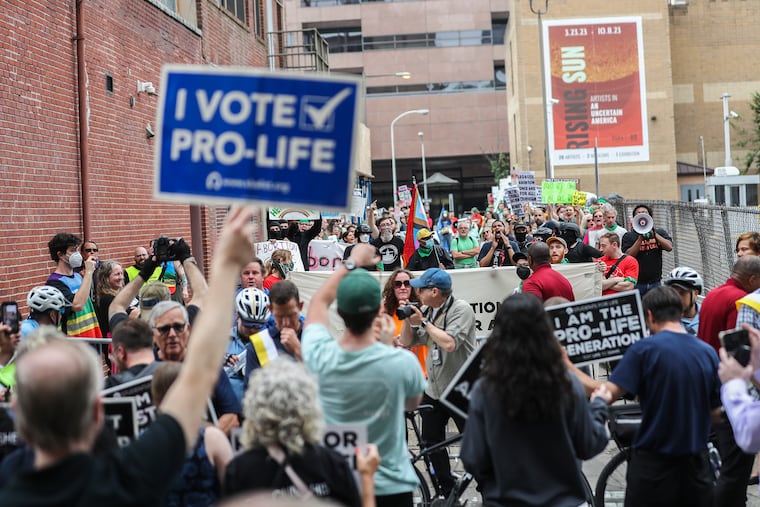The one-year anniversary of the decision declaring no right to abortion drew clashing views in Center City
Philadelphia March for Life in Center City advocated more restrictions on abortion. Counterprotesters talked of freedom to decide.

Hundreds of people opposed to abortion rights marched through Center City on Saturday on the one-year anniversary of the Supreme Court decision overturning Roe v. Wade to celebrate and pray for what they called a culture of life, shadowed by dozens of protesters advocating the freedom to make health choices without government interference.
The two groups met on the lawn of Independence Mall, separated by metal barriers and helmeted police officers on bicycles.
“I’m exhorting you today to double down. … In this post-Dobbs era, we need to be all in,” said Mark Houck, a prominent Bucks County antiabortion activist who was arrested last year on federal charges after he was accused of shoving a Planned Parenthood volunteer.
Houck had been protesting in front of a Locust Street clinic; he was later acquitted. “You can’t dip your toe in the pro-life era,” Houck told the crowd gathered on the lawn Saturday.
On the sidewalk along Market Street in front of the lawn, a few dozen abortion-rights activists tried to shout over the speakers with chants such as “Get your rosaries off my ovaries” and “Rise up for abortion rights, for abortion rights rise up.”
Nearby, tourists were lined up the length of the mall waiting to see the Liberty Bell.
“We’re trying to provide a presence to show that Philadelphia is a city of freedom and we’re against fascism,” said Miriam Oppenheimer, 55, of West Philadelphia. She referred to the abortion-rights opponents giving speeches in the background: “Those guys are forced birthers, which is cruel and unusual punishment.”
The protesters were part of a coalition including Democratic Socialists of America, Rise Up 4 Abortion Rights, Women’s March and Indivisible. Several held a large green banner that read: Legal Abortion Nationwide Now.
Participants in the Philadelphia March for Life and the rally included young mothers holding infants or pushing toddlers in strollers, retirees, Catholic nuns and priests. Members of Students for Life carried signs that read “I am the pro-life generation” and “The future is anti-abortion.”
Jack Ezickson, 65, of Paoli, held a sign that read, “I demand protection at conception.” Asked how he would describe things one year after Dobbs, he said: “God is on the move,” but added that the work is not over, citing medication-induced abortion. “The pill is now the stealth weapon. It’s like the drone. Nobody sees it, nobody hears it, it just destroys,” Ezickson said.
Since the Supreme Court overturned the landmark Roe v. Wade, which legalized abortion nationwide, 20 states have passed either a ban or highly restrictive policies on abortion. A year after the court’s decision in Dobbs v. Jackson Women’s Health Organization, 25 million women live in states with abortion bans or more restrictions on abortion. But 22 states and the District of Columbia have protected or expanded access to abortion.
The issue has supercharged politics. Many analysts believe that voters motivated by restrictions on abortion helped Democrats minimize GOP gains in the 2022 midterms and keep control of the U.S. Senate, for instance.
Andrew Lefkowitz, a Glenside resident who was protesting Saturday, said he believes a backlash has been building against right-wing policies since last year’s ruling.
“I feel like people are getting fed up with these Christian fascists, not just about abortion, but the banning of books and making it more difficult to get trans health care,” said Lefkowitz, who is 29. “I’m hoping to see more people in the streets nonviolently fighting.”
But Maria Marlowe, 70, of Coatesville, held a sign identifying herself as a “Feminist for Pro-Life” and a Democrat.
“I believe that a justice-driven society can solve a woman’s crisis pregnancy without killing an innocent person,” she said. “The truth will out. It might take years. It might take centuries. The truth that science has given us is this [a fetus] is a human being.”
Marlowe allowed that her two daughters, ages 38 and 35, are only “sort of supportive of me” on the issue.
Public opinion on abortion in the U.S. has been steady for several decades, with about 60% of Americans believing it should be legal in all or most cases, according to Pew Research Center, with more restrictions later in a pregnancy. Pew also identified in a review of its polls a jump in the percentage of people living in states with bans who believe abortion should be easier to access.
Pennsylvania Attorney General Michelle Henry said in a statement that, while there “may be confusion” about the status of abortion rights amid new restrictions, abortion remains legal in Pennsylvania by both medication and in-clinic surgical procedures. Under state law, abortion is permitted through the 23rd week of pregnancy, or later in certain instances in which the mother’s health is in danger.
“In New Jersey, we believe pregnant people have every right to make health care decisions free from government interference,” Attorney General Matthew J. Platkin said in a statement. A New Jersey law enacted last year guarantees access to abortion and contraception.
This article contains information from the Associated Press.